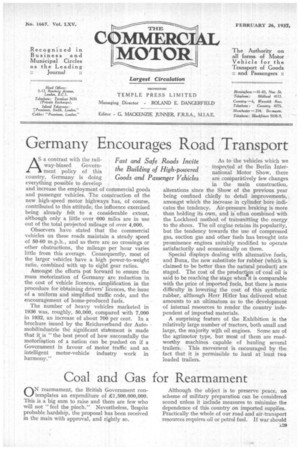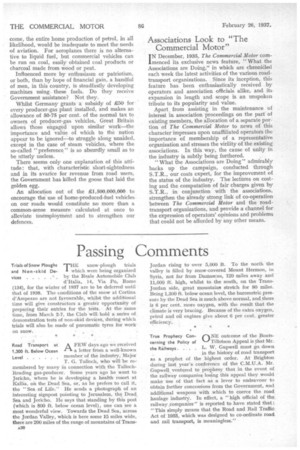Coal and Gas for Rearmament
Page 31

Page 32

If you've noticed an error in this article please click here to report it so we can fix it.
(-NN rearmament, the British Government con templates an expenditure of £1,500,000,000. This is a big sum to raise and there are few who will not "feel the pinch." Nevertheless, *despite probable hardship, the proposal has been received in the main with approval, and rightly so. Although the object is to preserve peace, no scheme of military preparation can be considered sound unless it include measures to minimize the dependence of this country on imported supplies. Practically the whole of our road and air-transport resources requires oil or petrol fuel. If war should come, the entire home production of petrol, in all likelihood, would be inadequate to meet the needs of aviation. For aeroplanes there is no alteniafive to liquid fuel, but commercial vehicles can be run on coal, easily obtained coal products or charcoal made from wood or peat.
Influenced more by enthusiasm or patriotism, or both, than by hope of financial gain, a handful of men, in this country, is steadfastly developing machines using. these fuels. Do they receive Government assistance? Not they.
Whilst Germany grants a subsidy of £50 for every producer-gas plant installed, and makes an allowance of 50-75 per cent. of the normal tax to owners of producer-gas vehicles, Great Britain allows those engaged upon similar work—the importance and value of which to the nation appear to be ignored--to struggle along unaided, except in the case of steam vehicles, where the so-called " preference" is so absurdly small as to be utterly useless.
There seems only one explanation of this attitude: that, with characteristic short-sightedness and in its avarice for revenue from road users, the Government has killed the goose that laid the golden egg.
An allocation out of the £1,500,000,000 to encourage the use of home-produced-fuel vehicles. on our roads would constitute no more than a common-sense measure ' calculated at once to alleviate imemployMent and to strengthen our defences.
Associations Look to "The Commercial Motor"
I N December, 1935, The Commercial Motor com menced its exclusive news feature, "What the Associations are Doing," in which are chronkled each week the latest activities of the various roadtransport organizations. Since its inception, this feature has been enthusiastically received by operators and association officials alike, and its• expansion in length and scope is an unspoken tribute to its popularity and value.
Apart from assisting in the maintenance of interest in association proceedings on the part of existing members, the allocation of a separate portion of The Commercial Motor to news of this character impresses upon unaffiliated operators the importance of membership of a representative organization and stresses the virility of the existing associations. In this way, the cause of unity in the industry is subtly being furthered.
"What the Associations are Doing" admirably backs up the campaign, conducted through S.T.R., our costs expert, for the improvement of the status of the industry. The lectures on costing and the computation of fair charges given by S.T.R., in conjunction with the associations, strengthen the already strong link of co-operation between The Commercial Motor and the roadtransport organizations, and provide a channel for the expression of operators' opinions and problems that could not be afforded by any other means.




























































































